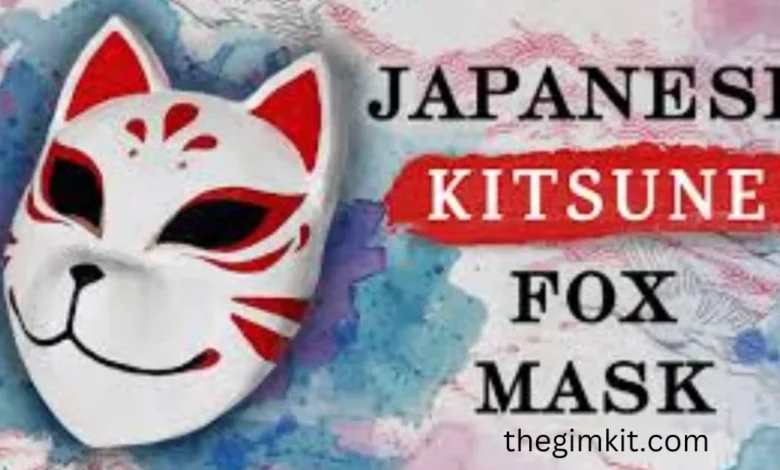The Symbolism Behind Japanese Fox Mask

Introduction to Japanese Fox Mask
Step into the spell-binding global of Japanese folklospell-bindinge, in which mysticism and symbolism intertwine in enchanting methods. The Japanese Fox Mask is one iconic image that captures the essence of this rich lifestyle. With records steeped in historical legends and deep-rooted meanings, these masks hold a special place in traditional ceremonies and modern variations. Join us on a journey as we explore the captivating symbolism behind the enigmatic Japanese Fox Mask.
The History and Origins of the Fox Mask
The history and origins of the Japanese fox masks date returned centuries, rooted in ancient folklore and conventional performing arts. Known as “kitsune,” these masks keep a deep cultural significance in Japan, representing the legendary fox spirits believed to own intelligence and magical abilities.
In Japanese mythology, foxes are revered for his or her shape-transferring powers and connection to the spirit world. The use of fox masks in rituals and theatrical performances can be traced returned to Shinto practices in which they have been worn to keep off evil spirits or invoke blessings.
Over time, the craftsmanship of making fox masks advanced, becoming an intricate art form passed down through generations. Each mask is meticulously crafted to capture the essence of the mischievous but smart nature attributed to fox spirits.
Today, these masks play a critical position in various cultural activities including festivals, theater performances, and even current popular culture variations. As an image of protection, awareness, and transformation, the Japanese fox masks remain an iconic illustration of lifestyle and spiritual ideals.
Meaning and Symbolism of the Fox in Japanese Culture
Japanese culture holds a deep reverence for the fox, regularly visible as a mystical and foxy creature. In Japanese folklore, the fox is thought to possess supernatural powers and intelligence. Often associated with the deity Inari, who’s revered as the god of rice and prosperity, foxes are taken into consideration as messengers between human beings and spirits.
The symbolism of the fox in Japanese subculture represents each right and awful omens. While a few view them as protectors bringing wealth and success, others see them as tricksters able to deceive humans. This duality reflects the complicated nature of lifestyles itself – full of contradictions and thriller.
With their ability to form-shift into human form, foxes characterize transformation and flexibility. They remind us to embody trade with grace and versatility. The charm of the fox lies in its enigmatic nature, inviting us to explore deeper meanings beyond what meets the eye.
Types of Fox Masks and Their Significance

When it comes to Japanese fox masks, there are numerous types every with its specific importance. The maximum commonplace is the “Kitsune” masks, representing a mischievous and playful fox spirit. It’s frequently seen in traditional Noh theater performances symbolizing foxy and trickery.
Another type is the “Inari” mask, related to the Shinto deity of rice and prosperity. These masks frequently feature a couple of tails to represent expertise and wealth. They are commonly used in fairs and ceremonies to invoke blessings for abundance.
The “Kyubi” mask is every other popular version depicting a 9-tailed fox known for supernatural powers and intelligence. In folklore, those mystical creatures are revered for his or her form-moving capabilities and magical prowess.
Each sort of fox mask holds its very own cultural significance, reflecting distinct factors of Japanese mythology and ideals. Whether worn in theatrical performances or as a part of nonsecular ceremonies, these masks serve as effective symbols connecting human beings to ancient traditions.
Cultural Events Where Fox Masks are Used
Cultural activities in Japan keep a wealthy tapestry of traditions and symbolism, with the fox mask being prominently featured in lots of celebrations. These masks play a crucial role in diverse faimasksnd rituals, including an element of thriller and charm to the festivities.
One such event is the Oji Fox Parade held annually in Tokyo, in which members don complex fox costumes and masks to honor the deity Inari. The vibrant procession winds its manner through the streets, showcasing difficult fox designs that captivate onlookers.
In addition to standard ceremonies, current cultural occasions like cosplay conventions also see the popularity of fox masks growing. Enthusiasts from around the sector gather to show off their creativity through unique interpretations of this iconic mask.
These cultural gatherings function as a testament to the iconic importance of the Japanese fox mask throughout generations and settings.
Modern Interpretations and Adaptations of the Fox Mask
In modern instances, the Japanese fox mask has found new interpretations and variations past its conventional roots. Artists and architects have taken thought from the magical air of secrecy of the fox in Japanese folklore to create cutting-edge versions of the masks.
These modern variations frequently combine conventional craftsmanship with revolutionary substances and techniques, giving an upward push to precise and visually striking designs. From fashion runways to artwork galleries, the fox masks have turned out to be a symbol of creativity and cultural fusion.
Furthermore, popular lifestyle has also embraced the allure of the fox masks, featuring them in movies, TV indicates, and even video games. Its presence in diverse varieties of leisure showcases its enduring appeal and undying allure.
By evolving with the times whilst staying proper to its symbolic origins, the Japanese fox mask maintains to captivate audiences internationally with its enigmatic beauty and significance.
Conclusion:
The Japanese fox mask holds a deep cultural significance that has been passed down through generations. From its origins in historical folklore to its modern interpretations in art and entertainment, the fox masks continue to captivate and intrigue human beings around the arena.
Whether worn in the course of conventional festivals or displayed as a piece of artwork, the fox mask symbolizes numerous factors of Japanese lifestyle, such as foxy, protection, and transformation. Its presence can be felt in different forms of creative expression, from Noh theater performances to current style designs.
Read More: Y2mate Video Download: Why It’s the Best Tool for Content Creators




